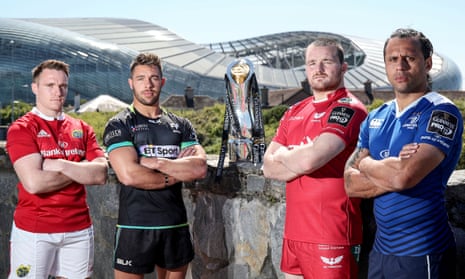Ambitious plans for Pro12 expansion in the US remain subject to concerns over governance issues within US rugby union and uncertainty regarding stadiums and potential support.
Responding to recent reports in the British press, high-placed sources in the US and UK told the Guardian that Houston was set to be announced by the end of this month as a Pro12 team, starting play in September 2018. Pro12 and USA Rugby executives made no comment, however, and conversations with other US stakeholders revealed unresolved issues.
One potential obstacle to any announcement of Pro12 plans this year is the sanctioning agreement for an “exclusive domestic club 15-a-side professional rugby league” held by Doug Schoninger, the New York businessman behind PRO Rugby. That five-team league completed its first season in July 2016 but has not returned, amidst controversy over contracts and payments. The PRO deal runs until April 2018.
“Without knowing the details of the proposed Pro12 team in Houston,” Schoninger wrote in an email to the Guardian, “we believe for many reasons a Pro12 team in the USA is a complete violation of our agreement with USA Rugby and World Rugby and we will defend our rights vigorously.”
Schoninger also said that he is “hopefully a month or so away from announcing our plans for PRO 2.0”, having “learned a lot in our beta inaugural year”.
Last September, USA Rugby voiced support for PRO Rugby in answer to expressions of Pro12 plans that included a Canadian team. Presentations were recently made in Edinburgh, however, by groups representing Houston, New York and Philadelphia. The Scottish Rugby Union, a Pro12 stakeholder, is known to be exploring commercial opportunities in North America. The English Aviva Premiership is active in the US, having staged a regular-season game in New Jersey in 2016. It will stage another in September.
In Houston, some question whether a Pro12 team could attract enough fans to make it financially viable. There are also local logistical problems, beyond the considerable challenge of flying teams between the US and Ireland, Scotland, Wales and Italy.
The preferred venue, the 22,000-capacity BBVA Compass Stadium, has staged international rugby: more than 20,000 fans attended the US Eagles’ match against Ireland in 2013 and Scotland in 2014, and 17,214 watched the US lose to Italy in 2012. In February 2016, 10,241 watched a 35-35 draw with an Argentina XV.
But the stadium already hosts Houston Dynamo MLS games, Houston Dash NWSL matches, international soccer fixtures and occasional concerts. It is also home, in the fall, to Texas Southern University’s American football team. That heavy schedule limits the number of free dates for rugby. More importantly, it places a strain on the field.
Adding 10 or so rugby matches risks causing serious damage, especially during the fall when gridiron is played there and the primary tenants, the Dynamo, are reaching the climax of their season. The stadium’s schedule is lighter at the start of the year but that is not grass-growing season, making pitch repair harder.
A possible alternative is Minute Maid Park, the home of MLB’s Houston Astros, but other than its downtown location it is far from ideal: too large, at nearly 42,000 seats, and with baseball dimensions that would detract from the spectator experience.

With such limitations in mind, Philadelphia, which has also hosted international rugby, has emerged as a possible second Pro12 venue. That would make the team’s identity more broadly American, in the mode of the Jaguares and Sunwolves in Super Rugby, teams that represent all of Argentina and Japan and employ a majority of players from those countries. The question of how many American players would be employed by any US-based Pro12 team remains open for debate.
Texas is also host to other ambitious rugby projects. With the launch of Major League Rugby, a competition that aims to begin play in 2018, Dallas, Austin and Houston are due to host teams. Jeremy Turner, president of the Houston Strikers, believes the city could one day harbour a pro team – but that there is not yet enough public demand.
The Strikers will be semi-professional and plan to focus on developing young talent, especially Americans, with a handful of foreign players. With the former Ireland prop Justin Fitzpatrick appointed head coach, last week they signed Charlie Hewitt, a 22-year-old former England schools lock who made five appearances for Worcester Warriors in 2016.
The club is hoping to build a 4,000-capacity stadium, after scaling down a plan to construct a 12,000-seat venue. Though Turner said the Strikers are backed by wealthy oil industry figures, they are adopting a slow and steady approach.
“We’ve done our homework pretty well,” he said. “We looked at the idea of having a really serious team here, we know the local rugby market very well and even though we have the funds available we decided that was probably foolhardy, to overdo it. The market here, the rugby community is about 2,000-2,200 people.
“The traditional sports here have a very, very firm grip and to compete against them with a high cost product is I think unlikely to be successful.”
Asked about the Pro12 plans, Turner said: “It’s up to them if they want to waste a huge amount of money, they’re welcome.”

Comments (…)
Sign in or create your Guardian account to join the discussion